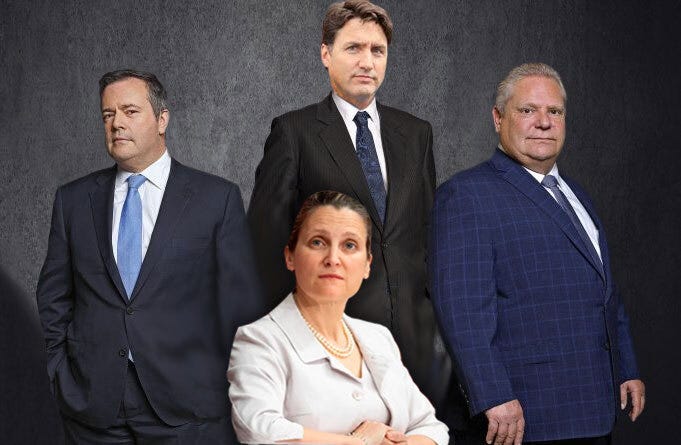I know, I know, the photo. We’ll get to that. First, two anecdotes.
In Saguenay in August 2002, Jean Chrétien announced he’d surrender to an organized campaign and retire as Liberal leader — 18 months later, one of the cheekiest moves of his career. The very next day, Chrétien was at the side of a highway with Bernard Landry, Quebec’s Parti Québécois premier, announcing joint highway funding. Ribbons to cut, fake smiles to smile.
It was a surprising move. Chrétien and Landry had despised each other for decades. Landry thought Chrétien made Quebecers look unsophisticated. Chrétien had his usual disdain for displays of arrogance from someone who, in Chrétien’s eyes, wasn’t even good at politics. Yet they pasted their smiles on and worked together.
Interests trumped gut. Chrétien needed to stay busy because he needed to stay legitimate while Paul Martin, his eventual successor, cooled his heels. Meeting a political enemy to advance the interests of an electorate they shared was Chrétien’s way of showing he still had his eye on his job.
Stephen Harper spent 2014 refusing to meet Kathleen Wynne, who was Ontario’s premier. They had serious policy disputes. Worse, she had described to the Toronto Star his behaviour during a private meeting, a species of perfectly human indiscretion that has always driven him up the wall. So he left her to stew while she wrote two letters pleading for a meeting. It must have felt delicious. It was dumb. I wrote a column explaining why. Five weeks later, at the beginning of 2015, they met. Each leader lost their next election. A subtle point: Of course I don’t think Harper lost power because he acted like a jerk toward a political adversary. But I do believe he lost power because, by 2014, he was the kind of guy who would act like a jerk.
There’s a centre in Canadian politics. Not a policy centre but a temperamental centre. It is occupied by people who don’t need to win every damned fight. Which means that, a lot of the time, it is occupied by people who are already familiar with the burden of government.
Which brings us to this week’s events. On Tuesday Justin Trudeau was in Toronto to meet Doug Ford, an Ontario premier he doesn’t much like. In the prime minister’s account, they discussed “making housing more affordable, strengthening health care, investing in infrastructure… meeting the growing demand for electric vehicles.” A courtesy call, two months after Ford’s Ontario Progressive Conservatives were re-elected. But it suggests Trudeau remains capable of courtesy and of noticing his job responsibilities.
Chrystia Freeland responded to a thuggish and frightening confrontation last week in Grande Prairie, Alberta by spending more time in Alberta, on Tuesday and Wednesday. Good for her. She knew she is welcome, even among level-headed political adversaries, in part because Jason Kenney had extended that welcome, and expressed his proper contempt for the ass who rounded on Freeland, again and again and again. In that expression of simple human empathy, Kenney joined Ford, Saskatchewan premier Scott Moe, and Quebec premier François Legault, who all made strong and unprompted statements.
Eventually, questioned by a reporter, Pierre Poilievre also called Friday’s bullying ambush “completely unacceptable” and then talked about unacceptable abuse and threats his own family has faced. Readers are free to assess that as they like.
I’ve been writing this newsletter for four months. Substack tells me which pieces readers like best. Broadly, it’s the ones where I try to figure out what the hell Justin Trudeau is thinking, and the ones where I write anything about Pierre Poilievre. But the single most popular piece here so far was this one, an almost artificially even-handed complaint about how much I miss seeing grownups in government. “We don’t trade up when everyone falls into habits of blame and deflection,” I wrote.
“My questions for any candidate, after all these years, are actually pretty simple. Is there anybody you like, beyond the person whose next vote you need? Is there any complexity you’ll acknowledge, any problem you’ll admit is hard, any flim-flam you’ll pass up because it’s beneath the dignity of the country you aspire to lead? Any at all?”
These are, frankly, sappy sentiments. They wouldn’t have struck a chord if they hadn’t managed to identify an unmet need, an unscratched itch, not for pointless and self-congratulating geometrical “centrists” but for people who will put some conception of the common good above ego stroking.
On this front, even from the perspective of a sometime admirer, Pierre Poilievre has consistently declined to step up. Which raises a question. Does that open up an opportunity for his opponent?
It might.
Keep reading with a 7-day free trial
Subscribe to Paul Wells to keep reading this post and get 7 days of free access to the full post archives.




